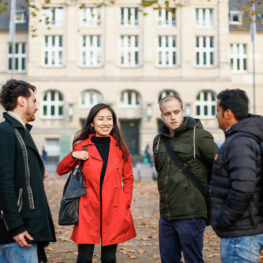Technische Hochschule Köln,
Institute for Technology and Resources Management
in the Tropics and Subtropics (ITT)
| Location | With over 23,000 students in 11 faculties, TH Köln is the largest institution of its kind in Germany. Due to its spectrum of research and wide range of high quality courses, TH Köln is a popular cooperation partner, maintaining numerous contacts with universities worldwide. Over 3,500 foreign students of 93 nationalities are studying at TH Köln. Cologne is a city of trade fairs and media, has international flair and offers a variety of cultural activities. |
| Course focus |
Institute for Technology and Resources Management in the Tropics and Subtropics (ITT) offers 3 separate Master Programs: • Natural Resources Management and Development (NRM) The study programs offer a market-oriented specialization and orientation. The profiles of graduates are formulated according to competency and based on the requirements of potential employers. Global population, economic growth and ongoing environmental deterioration put increasing pressure on renewable resources such as food, material, water and energy. The master programs aim at educating professionals with lateral understanding and transdisciplinary approaches for sustainable development. Based on a systemic understanding of productive, consumptive and regulative functions of socio-ecological systems and the differing and competing value systems of relevant stakeholders, MSc graduates develop and provide solutions. Those solutions are based on an integrated managerial perspective, referring to the relevant legal frameworks, negotiating with stakeholders and applying consistently different mechanisms of resources allocation. Content Modules of the program catalogues NRM: Modules of the program catalogues IWRM: Modules of the program catalogues REM: Elective Modules “Methods and Tools”: In addition to core modules, each student has to choose a minimum of five modules from the own program catalogue (NRM, IWRM or REM), two elective modules from the catalogues “Methods and Tools” and three elective modules from any module catalogue, including the catalogues of the adjoining master programs. Targeted employers are private sector companies and service providers, public institutions in countries of the global South (ministries, public sector service providers, planning institutions), businesses and institutions of international cooperation (research, technical and economic cooperation programs) with a high international mindset working in the field of natural resources, water resources and renewable energy management, project implementation and evaluation as well as consulting. |
| Target group | The master programs are designed for young professionals of various academic backgrounds: engineers, natural scientists and social scientists, who hold at least a bachelor’s degree and have professional experience relevant to one of the three master programs. Fluent English is required; basic German language skills are strongly recommended. Applicants should enjoy intercultural engagement, be motivated to cooperate interdisciplinarily and across traditional industrial sectors. |
| Course language | English |
| Entry requirements |
|
| Degree Awarded | Master of Science (M.Sc.) |
| Course Begins | Winter term (September) |
| Course Duration | 24 months |
| Duration of German language course prior to beginning of programme
Application deadline |
2 months (for students awarded a DAAD-scholarship)
Applicants applying for a DAAD scholarship: Application procedure for regular foreign students: |
| Remarks |
|
For further information contact
Institute for Technology and Resources Management
in the Tropics and Subtropics (ITT)
Ricarda Bruder Pedroso
Betzdorfer Straße 2, 50679 Cologne
Phone: +49-(0)221-8275-4148
Fax: +49-(0)221-8275-2736
Email info-nrm@itt.th-koeln.de
info-iwrm@itt.th-koeln.de
info-rem@itt.th-koeln.de
Website: http://www.tt.th-koeln.de



